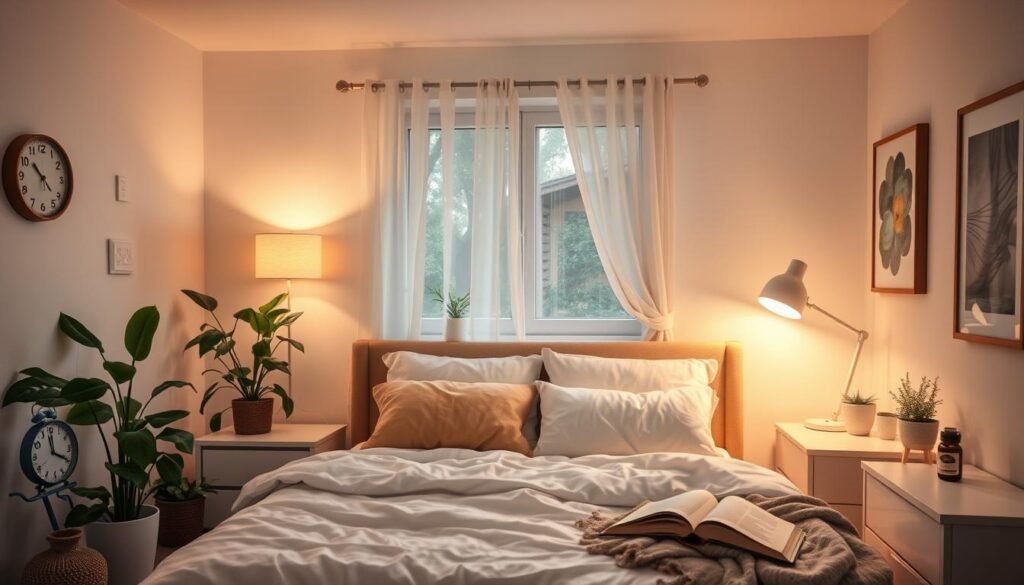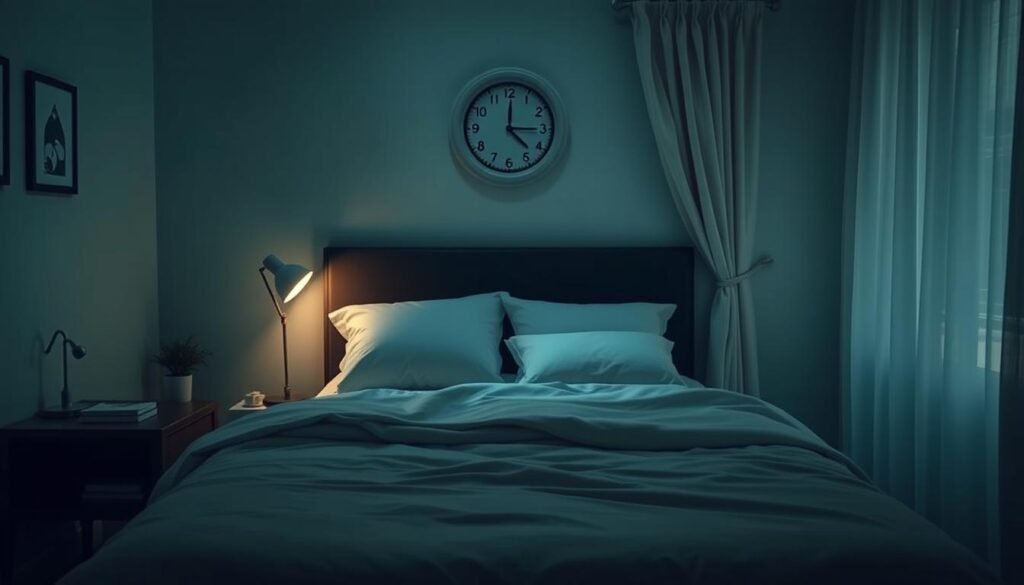Did you know that 70% to 80% of people with primary insomnia get better with cognitive-behavioral therapy for insomnia (CBT-I)? This shows how effective behavioral approaches are. They deal with the thoughts and actions that mess up our sleep. Many suffer from insomnia, and it can hurt our daily life and health. Luckily, there are good sleep strategies that don’t need drugs, which can have bad side effects.
This article will explore different treatments for insomnia. It will highlight how behavioral methods help build better sleep habits. Instead of just using medicine, one can try these new ways to get back to sleeping well. By learning and using these techniques, you can beat insomnia and enjoy deep sleep again.
Key Takeaways
- Cognitive-behavioral therapy (CBT) is proven to be more effective for chronic insomnia than prescription medications.
- Many treatment programs report significant improvement in sleep patterns after just 5 to 8 sessions.
- Good sleep hygiene practices are crucial in establishing effective sleep strategies.
- Stimulus control therapy can help modify negative habits that interfere with sleep quality.
- Relaxation techniques are essential components of CBT-I, aiding in unwinding before bedtime.
- Behavioral sleep medicine therapists are limited, making access to expertise crucial.
Understanding Insomnia
Insomnia makes it hard to fall or stay asleep. This leads to feeling tired, irritable, and unfocused during the day. It’s crucial to understand the insomnia definition to find the right sleep solutions.
Insomnia comes in two main kinds: acute and chronic. Acute insomnia happens due to stress or changes in your life and is short-term. On the other hand, chronic insomnia lasts longer, happens at least three nights a week, and goes on for more than three months. Around 10% of adults will face chronic insomnia at some point.
Insomnia can really affect your mind. Studies show that long-term insomnia can lead to anxiety, depression, and a drop in mental health. People with sleep issues often have other health problems too. Treatments like Cognitive Behavioral Therapy for Insomnia (CBT-I) and Brief Behavioral Therapy for Insomnia (BBT-I) are effective. CBT-I, for instance, includes 4 to 12 sessions to improve sleep habits.
Dealing with insomnia means working with a healthcare provider to look at your sleep and health issues. Behavioral therapies often work better and last longer than just taking sleep meds.
If you’re looking to manage insomnia, trying behavioral treatments like CBT-I can be very helpful.
Learn more about these behavioral remedies for insomnia, including a comprehensive review of effective treatments, here.
Importance of Sleep
Sleep is crucial for our well-being. It greatly affects our sleep health and how we function daily. The benefits of sleep go beyond just resting. They include better thinking, stable emotions, and good physical health. Not sleeping enough can make us feel unclear and cranky, making it hard to get things done.
About 33% to 50% of adults have trouble sleeping. Not sleeping enough can lead to serious problems like obesity, heart disease, and diabetes. So, it’s important to know how lack of sleep affects us. This helps us stay healthy and sharp.
Studies show that CBT-I is better than sleep drugs for insomnia. It cuts down the time it takes to fall asleep by 19 minutes. It also adds 8 minutes to total sleep time. CBT-I works by tackling what causes insomnia, not just the symptoms.
Getting enough sleep makes us feel happier and strengthens our immune system. But, bad sleep can cause lasting problems. Meeting a sleep expert can help improve how we sleep. This leads to better sleep health and life quality.
| Aspect | Cognitive Behavioral Therapy for Insomnia (CBT-I) | Sleep Medications |
|---|---|---|
| Average Reduction in Sleep Latency | 19 minutes | Varies |
| Total Sleep Time Improvement | 8 minutes | Varies |
| Sleep Efficiency Improvement | 10% | Possible side effects |
| Side Effects | None | Amnestic episodes, cognitive impairment |
Common Causes of Insomnia
Insomnia can be caused by many things that disrupt sleep. Knowing these causes helps us manage and treat it.
Lifestyle factors like bad sleep habits contribute to insomnia. This includes not keeping a regular sleep schedule and eating late at night. Too much caffeine and nicotine are also bad. Stress and anxiety can cause short-term insomnia, lasting days or weeks. Long-term mental health problems, like anxiety and depression, can lead to chronic insomnia.
Medical issues such as chronic pain and breathing problems are common in people with insomnia. Older adults often experience insomnia more due to changes in sleep habits, health problems, and medication side effects. Women are more likely to have insomnia because of hormone changes during their lives.
In kids and teens, a delayed internal clock can mess with how well they sleep. Understanding different causes of insomnia helps us find the right treatment. It’s important to look after mental health, as it significantly affects sleep quality.
| Insomnia Causes | Details |
|---|---|
| Stress | Life events or ongoing anxiety can lead to sleep disturbances. |
| Poor Sleep Habits | Irregular sleep schedules and late-night eating disrupt sleep. |
| Lifestyle Factors | Caffeine, nicotine, and alcohol abuse impact sleep quality. |
| Medical Conditions | Chronic pain, hormonal changes, and respiratory disorders affect sleep. |
| Age | Older adults and women may experience insomnia due to hormonal shifts and health problems. |
It’s key to tackle these common causes of insomnia to better sleep and well-being.
Sleep Hygiene Techniques
Good sleep hygiene is key to better sleep and health. Using effective sleep hygiene techniques improves sleep quality. It helps fight insomnia. Setting a regular sleep schedule, making your bedroom sleep-friendly, and limiting light before bed are all important.
Establishing a Consistent Sleep Schedule
Sticking to a consistent sleep schedule is crucial for sleep hygiene. Sleeping and waking up at the same times daily helps your body’s clock. This improves sleep quality. It may also decrease sleep problems, like difficulty falling asleep. Setting alarms or reminders can help maintain this schedule.
Creating a Relaxing Sleep Environment
Creating a calm sleep setting is vital for good sleep hygiene. Your bedroom should be quiet, dark, and cool for optimal rest. Key factors include:
- A comfortable mattress and pillows
- High-quality bedding
- Controlling light and noise
- Relaxing scents, such as lavender
Removing distractions like gadgets encourages relaxation. Aim to make your bedroom a space just for rest. This makes the sleep environment better.
Managing Light Exposure Before Bed
Managing how much light you see is key before bedtime. Limiting bright light at night helps your natural sleep rhythm. Ways to do this include:
- Dimming lights as bedtime gets close
- Using blackout curtains for external light
- Not using devices with screens before sleeping
These steps can boost sleep quality. They help your body get ready for sleep naturally.

Cognitive Behavioral Therapy for Insomnia (CBT-I)
Cognitive Behavioral Therapy for Insomnia, also known as CBT-I, helps people change negative thoughts and behaviors about sleep. It works better in the long run than just quick fixes. Insomnia hits about 6–10% of folks, and CBT-I gives them powerful tools to improve their sleep.
Overview and Effectiveness
Studies show CBT-I can make insomnia better for up to 80% of people who try it. It usually takes 4 to 8 sessions. People learn to think differently about sleep and change beliefs that aren’t helpful. It tends to work better than sleeping pills, and many stop using medicine for sleep after trying CBT-I.
Techniques Used in CBT-I
Key techniques of CBT-I help create healthier sleep habits, such as:
- Cognitive Therapy (CT): This helps change unrealistic beliefs about sleep by finding and fixing unhelpful thoughts.
- Stimulus Control Therapy (SCT): Changes behaviors that lead to being awake at night.
- Sleep Restriction Therapy (SRT): Works to increase the need to sleep, making it easier to stay asleep.
- Sleep Hygiene (SH): Teaches practices that support good sleep, even though they’re not strong on their own.
People with other issues like anxiety or depression often feel better about their sleep with CBT-I. The small risks, like dealing with tough thoughts, are worth the big long-term benefits.
| CBT-I Techniques | Description | Expected Outcomes |
|---|---|---|
| Cognitive Therapy | Changes negative thoughts about sleep. | Better sleep expectations |
| Stimulus Control Therapy | Adjusts behaviors that cause awakening. | Less waking up at night |
| Sleep Restriction Therapy | Reduces bed time to boost sleepiness. | Quicker to fall asleep |
| Sleep Hygiene | Promotes habits for good sleep. | Better overall sleep quality |
Stimulus Control Therapy
Stimulus control therapy is designed to improve sleep by training your mind to link the bedroom with sleep. It works well for both short-term and long-term insomnia, tackling various sleep problems. Sleep associations that encourage a good night’s rest are developed during this therapy.

One key rule of this therapy is to use the bed only for sleep and intimacy. Many notice that using the bed for other activities weakens the sleep connection. If you can’t sleep after 20 minutes, it’s better to get up and do something relaxing instead of just lying there. This habit helps overcome insomnia.
To really benefit from this therapy, following the guidelines closely is crucial. If you stick to the rules, you have a 50% chance of mastering sleep control. However, neglecting the guidelines drops your odds to 12.5%. These numbers show how vital a regular sleep schedule is.
At first, some may find they sleep less as they adjust to this therapy. Having the support of a partner or a sleep coach can make a big difference. The ultimate aim is to enjoy consistent, quality sleep by creating a strong bond between your space and rest, improving overall sleep quality.
Sleep Restriction Therapy
Sleep restriction therapy (SRT) is a way to treat chronic insomnia and sleep disorders without medicine. It aims to improve sleep by limiting time in bed to the actual sleep time. This method was developed by Dr. Arthur Spielman, a famous neurologist. It’s known for helping sleep issues effectively without drugs.
To use SRT, one must keep a sleep diary. This diary helps calculate how efficiently one sleeps. Healthcare professionals suggest waking up at the same time daily. This routine helps the body’s internal clock and leads to better sleep.
Over time, people in SRT may spend more time in bed if their sleep is good. But they should never sleep less than 5.5 hours. This ensures they get enough rest. Many people report sleeping better, waking up less at night, and feeling more alert during the day.
In the beginning, SRT can be hard because of sleep loss. You might feel tired during the day as you get used to the schedule. It’s key to keep a regular schedule and not nap. Sticking with the therapy for a few weeks is needed for it to work well.
Even though it’s challenging, SRT can greatly help with insomnia over time. If you’re thinking about trying SRT, talk to a doctor first. This is especially important for those with health issues. This ensures the therapy is safe and effective for you.
Relaxation Training Techniques
Relaxation tricks are key for beating stress and anxiety tied to not sleeping well. Adding breathing exercises and muscle relaxation to bedtime habits helps. This can create a calm state that leads to better sleep. Practicing these relaxation methods can calm the mind and relax the body. That way, you’re ready for deep sleep.
Breathing Exercises
Breathing tricks work well to get the body ready for sleep. Techniques like diaphragmatic breathing and the 4-7-8 method slow your heart rate and lower stress. Focusing on breathing helps trigger a relaxed state, making sleep come more naturally. Check out some popular breathing exercises:
- Diaphragmatic Breathing: Uses the diaphragm to bring in more oxygen and help relax.
- 4-7-8 Breathing: You inhale for four seconds, hold for seven, and exhale for eight seconds to relax the nerves.
- Bhramari Pranayama: A humming breath tactic to lessen anxiety and induce calm.
For more on these methods, look at this page. It has lots of ways to relax and sleep better.
Progressive Muscle Relaxation
Progressive muscle relaxation is yet another method to relieve tension and sleep well. You tense and then relax each muscle group, starting from the face down to your feet. Letting go of muscle tension this way helps achieve total relaxation. This aids in improving sleep quality.
| Technique | Description | Benefits |
|---|---|---|
| Diaphragmatic Breathing | Breath control using the diaphragm for deeper inhalations. | Increases relaxation and oxygen flow. |
| 4-7-8 Breathing | Inhale for 4 seconds, hold for 7, and exhale for 8. | Calms the nervous system effectively. |
| Progressive Muscle Relaxation | Tensing and then relaxing muscle groups. | Helps in reducing overall body tension. |
Using these relaxation techniques nightly can really improve your sleep. You can adapt each method to what fits you best. Doing so ensures a night of restful sleep tailored just for you.

Mindfulness-Based Stress Reduction
Mindfulness-Based Stress Reduction (MBSR) offers effective strategies for tackling insomnia. It teaches people to be aware of their thoughts and feelings without judgment. This approach helps control the worry that often leads to not being able to sleep.
Mindfulness-Based Therapy for Insomnia (MBTI) is set up over eight weeks, plus one day spent in retreat. It’s designed for small groups to foster support. Here, individuals learn stress reduction techniques for better sleep. It combines proven behavioral treatments with mindfulness for a top-notch approach to insomnia relief.
The therapy starts with guided sessions on mindfulness meditation. These sessions help people learn how to deal with nighttime issues. They focus on accepting and releasing their emotional reactions to sleep problems. Using these techniques regularly can greatly improve sleep quality.
A lot of people face sleep issues, with up to 75% of American adults experiencing some sort of sleep disturbance. About 10–15% deal with serious insomnia. Many choose methods other than drugs to stay away from the side effects of sleeping pills. A study on MBTI showed promising results. Half of its participants cut their awake time at night by half. Plus, 61% did not have their insomnia come back within a year. These findings show the strong, lasting benefits of mindfulness on overcoming sleep problems.
Behavioral Approaches to Overcome Insomnia
Many strategies for beating insomnia involve changing bad habits and thoughts that hurt sleep quality. These methods highlight the need for good sleep practices, which are key in beating insomnia. Having a regular sleep schedule helps a lot because being consistent strengthens sleep.
CBT-I, or cognitive behavioral therapy for insomnia, is known as one of the top treatments. It uses several steps, including stimulus control therapy. This approach advises sleeping and waking up at the same time every day, staying away from naps during the day, and using the bed only for sleep and intimacy. These steps improve sleep habits and give people more control over their sleep issues.
Along with CBT-I, relaxation methods can lower stress and anxiety, which often block good sleep. Activities like meditation and mindfulness help calm the mind, leading to better sleep. While yoga or tai chi are beneficial for some, their effectiveness isn’t always backed by science.
Embracing these strategies helps overcome insomnia and gives people tools for future sleep challenges. Making lifestyle adjustments, such as reducing caffeine and alcohol, also boosts these sleep techniques. This leads to better health and well-being overall.
Finding a Professional to Help
Dealing with insomnia often means getting help from experts. When you talk to sleep specialists, your sleep can get much better. These professionals know how to figure out sleep issues. They create special plans for each person. To find the right help, look into local sleep centers and clinics. They provide complete checks and treatments.
CBT-I is a great help for long-term insomnia sufferers. This method changes bad thoughts and actions about sleep. Seeing a psychologist skilled in CBT-I can really improve how you manage sleep problems. If insomnia affects your day, mood, or health, get help early.
Go to the American Academy of Sleep Medicine to find good CBT-I experts and other sleep pros. They offer help in person or online, making it easy to get the support you need. By taking action and working with experts, you can get a treatment plan. This plan will improve your sleep and health.
Conclusion
Many people struggle with insomnia, but overcoming it is possible. Using insomnia success strategies like cognitive behavioral therapy (CBT-I) helps a lot. CBT-I targets the root causes of sleep problems, improving sleep quality and overall well-being.
Studies show CBT-I works better than drugs for long-term insomnia. It has fewer side effects and tackles the real problems. Adding sleep hygiene and relaxation tips can lead to restful sleep. This holistic approach helps people win back their nights.
Knowing and using these strategies is key for better sleep. For deeper understanding, check out a study about CBT-I versus medication here. Making smart choices helps achieve lasting sleep health.